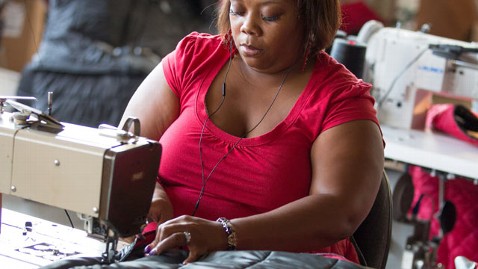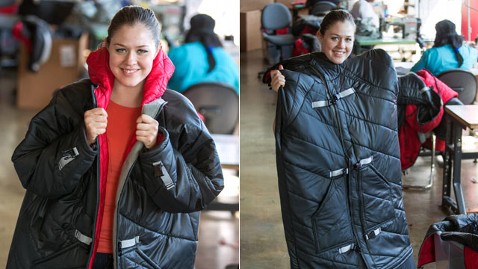Sleeping-Bag Coats Warm, Employ Detroit Homeless

Tanisha Talton stitches a coat. (Image Credit: John F. Martin for General Motors)
One woman's college class project to design coats that double as sleeping bags for the homeless has become a nonprofit initiative to employ and empower the homeless population of Detroit, and maybe even the world.
The Empowerment Plan began in 2010 as an idea to fulfill Veronika Scott's assignment for her product-design class at the College for Creative Studies in Detroit.
"We had to design something that could actually happen," Scott, 22, of Detroit said.
Scott's product was a coat that transformed into a sleeping bag for the homeless population of Detroit. The latest design is a lightweight, self-heated and waterproof coat with pockets, a hood and a section that pulls out to become the foot of the sleeping bag. It can be rolled up and turned into a shoulder bag for the warmer months.
For five months, and even after her class ended, Scott worked with the homeless at the shelter Neighborhood Service Organization in Detroit to develop the first prototype of the coat.
"I became known as the crazy coat lady," Scott said.
Scott said the coat was initially meant to offer comfort and pride for the homeless, but one homeless woman's words changed that.
"She said, 'Your coats don't matter, jobs matter. We need jobs, not coats,'" Scott said. "It was then about who I could employ."

Scott models her invention. (Image Credit: John F. Martin for General Motors)
The Empowerment Plan employs 13 former and current homeless people to manufacture its coats. The organization only hires homeless single parents without a violent crime record. Employees are paid well above the minimum wage in Michigan and are given microloans.
"This is a lesson in being employed," Scott said, adding that one of her employees spent her life on the streets in prostitution. "She took her microloan and got a car and re-enrolled in school."
The coats are not only ordered by nonprofit organizations for free distribution to the homeless, but are also used by the Red Cross for disaster relief. With the help of donations and machines, materials for the coats, and contributions from Detroit-area companies like General Motors and clothes-maker Carhartt, the Empowerment Plan plans to create 4,000 coats this year.
"Veronika's remarkable passion to create a program that offers warmth and shelter and ultimately jobs to help the city's homeless population is inspiring and necessary to be involved with," Tony Ambroza, vice president of marketing for Carhartt, said. "We are honored to be a part of this inspiring movement that Veronika has started right here in our city."
Sharon Basel, a spokeswoman for General Motors, said the company donated 2,000 yards of sound absorption material used in its vehicles last year for insulation in the coats.
"Veronika's a unique humanitarian with a really wonderful concept who's already done a lot of good not only in the Detroit area, but also in spreading that good in other urban areas across the country," Basel said. "We feel proud about providing one small thing to help her efforts."
Each coat costs $99 to make, so the Empowerment Plan asks for donations of $100 per coat. Scott hopes increased production will push the manufacturing cost down to $60 a coat by year's end. The coats come in one size for now but a shorter version is in the works.
While Scott wants Detroit to remain the main hub for the Empowerment Plan, other locations have asked about offering the training program for their homeless populations, including Paris and Portugal.
Scott said that she wants the Empowerment Plan to be a model for U.S. humane manufacturing. "You need to invest in people the way you invest in your machine," she said. "You're going to get a longer term of very high quality work."
In the coming months, Scott is going to launch a buy one-get one opportunity, so people can donate a coat to an organization of their choice, and a for-profit company can create more employment opportunities for the homeless.
"I was raised in a situation of poverty," Scott said.
"It wasn't abstract as it is for most people. So knowing that can happen to my family means that can happen to anyone."